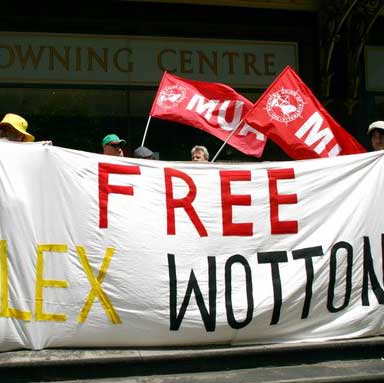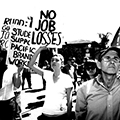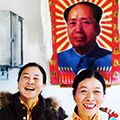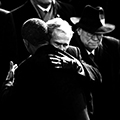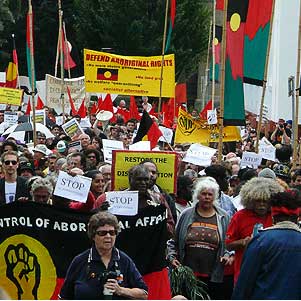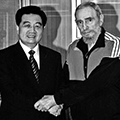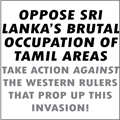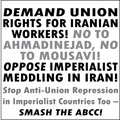Tibetans pose for a photo behind a portrait of their beloved Mao Tse Tung.
Former slaves and serfs and their descendants were ecstatic after the parliament of the Tibetan Autonomous Region of the PRC announced that March 28 would be celebrated as Serfs Emancipation Day. The day marks the 50th anniversary of the day when Tibetan communists and the Mao-led Chinese state began to abolish the slavery and serfdom of the former Dalai Lama-ruled Tibet.
“State Capitalism”?
Those Western leftists that have written off the PRC as “capitalist” have been faced with the thorny issue of the continued state ownership of the PRC’s key industries. When many smaller enterprises were privatized in the late 1990s-early 2000s, anti-PRC groups predicted that China’s core industries would soon be sold off as well. But this has not happened. So now anti-PRC leftists attempt to “deal” with this contradiction by exaggerating the level of private control of the Chinese economy. In doing so they sometimes tie themselves up in knots. For example in the 2007 article referred to above, the CWI group makes much of the existence of a private Chinese bank, Minsheng Banking Corp. “China’s first privately owned bank,” the article notes, “Minsheng is now the seventh largest bank on the mainland ….” But that description begs the question: what about China’s first, second, third, fourth, fifth and sixth largest banks? The answer: they are all state-owned! Indeed in the PRC, the share of revenues going to state-owned firms is 94% in banking and 97% in insurance (
The Australian, 11 August 2008.)
Now, as it becomes more apparent that China’s key industries remain in state, and not private, hands, some anti-PRC leftists are adjusting their analysis. Groups like the CWI and the DSP now speak more and more in their articles of “state capitalists” in China. In this they drift towards the theories about “State Capitalism” (which they formally do not agree with) advocated by the Socialist Alternative and Solidarity groups. According to this “State Capitalism” theory, the whole PRC administrative layer has been since 1949 simply another capitalist exploiting class but one that gains its profits through collectively exploiting those workers who are employed in state industry.
The Socialist Alternative and Solidarity groups adopt their “State Capitalist” analysis of the PRC from the theories of British left-wing leader Tony Cliff. Cliff had at one time been an activist in the Trotskyist Fourth International. But when the Cold War hit in the late 1940s, Cliff buckled and adapted his theory to accommodate the anti-Soviet stampede. He came up with the theory that the Soviet Union had turned from a workers state to a “state capitalist” country in the late 1920s (except he had not noticed this counterrevolution until 20 years later!) Furthermore, he went on to brand anti-capitalist revolutions in China, Cuba, Vietnam etc as simply transitions from one form of capitalism to another. Cliff’s whole theory conveniently armed him and his supporters with the rationale they needed to avoid having to defend the USSR, PRC etc during the Cold War. During the 1950-53 Korean War, the Cliff group publicly refused to defend the Chinese and North Korean deformed workers states against U.S./British/Australian imperialism and their South Korean capitalist puppets. The Cliff group was rightly expelled from the Trotskyist Fourth International for this stance.
The claim that the PRC, Cuba, Vietnam etc have never been anything but capitalist is not only promoted by the Cliff-line of left groups but also by many anarchist groups. But the problems with the Left’s orientation to the socialistic states goes beyond this analysis. When the USSR was being besieged during the Cold War, most of the Western socialist groups capitulated to anti-Soviet “human rights” propaganda and ended up supporting the U.S.-backed anti-communist forces. Today, all the various left tendencies that lined up against the former USSR are now aligned against the PRC. The only difference is that two decades ago, some of those left groups that opposed the then most powerful socialistic state did so while formally recognizing that it was still a workers state. Today, nearly all the left tendencies that oppose today’s most powerful workers state, the PRC, claim that the PRC is actually just another capitalist state. This common false analysis, unfortunately, makes it even easier for these tendencies to support anti-PRC anti-communists today than it was to fall in behind anti-Soviet anti-communists two decades ago.
Now, the various anti-PRC left groups do differ in their historical analysis of the PRC. Organisations like the DSP and RSP (unlike the Cliff-origin groups) do rightly recognise that the 1949 Revolution created a working peoples’ state in China. But in so doing these particular groups are presented with a rather serious theoretical dilemma. For by claiming that the PRC has now gone capitalist they are accepting that a capitalist counterrevolution has taken place without the PRC even experiencing a change in governing party (or even at least a name change of that party!) To argue in this way that the 1949 Revolution can be destroyed through a series of gradual reforms over a number of years implies that the 1949 Revolution must have been a rather shallow, lifeless event. But it was far from this! It was the biggest revolution in history. A revolution that actively involved tens of millions of poor peasants and workers. Those toilers made incredible sacrifices with their blood and sweat to defeat a murderous U.S.-backed enemy class. Such a deep-going mass revolution cannot be liquidated without a series of decisive events - events that would involve a change in political regime, like the convulsive events that saw the overthrow of Communist Party rule in the USSR.
Whatever their different analyses of 1949, those left groups that are today anti-PRC are more or less congregating around an analysis that today’s China is ruled by “state capitalists” in combination with private capitalists. Such a theory is deeply flawed for many reasons. For one, in the real world a “state capitalist” system could not last in any country for more than a short space of time. Why? Because if those administering state power are the very same individuals that are systematically extracting the biggest fortunes then it becomes too obvious to the masses that the state only exists for the benefit of a few. That is why in real capitalist societies the system is set up so that there is some pretence of separation between the capitalist bosses and the state. The state bureaucratic/military/ legal organs are the ones that enforce capitalist exploitation. But still they maintain a pretence of governing “for all.” Of course Leninists understand that the state in a capitalist society is indeed completely a capitalist state. The controlling sections of the state machinery are hooked up by a thousand wires to the actual capitalists - through corporate representation in state bodies, shared privilege, family ties, private school old boy networks, bribery etc. But the capitalist rulers are not stupid enough to have the very richest tycoons being exactly the same people as the heads of state. What is more, the wealthiest capitalists derive their fortunes not from government salaries but from private sector exploitation of labour (which is, of course, enforced by the state.) If, in contrast, you can imagine a situation where it turns out that James Packer, Dick Pratt, the Lowys, Andrew Forest and so on got their obscene riches from government, rather than private, corporations then the government would be facing a revolt from the masses within weeks.
Even if it was somehow possible to have a stable “state capitalist” ruling class, such a class is not what the governing bureaucratic layer in the PRC actually is. It does not have the features of a capitalist exploiting class. To be sure, those in administration do have certain privileges. But these privileges are not of the type that the bourgeoisie in the capitalist world get from systematic exploitation of labour. That there are bureaucratic privileges at all in the PRC, of course, shows how much work is yet to be done before the victory of socialist construction is complete. The still as yet unresolved tensions between different layers of PRC society allows for a big role for officials as arbitrators of the conflicting demands of society. And these dividers of the social cake ensure that some of the best bits are set aside for themselves. Administrative privilege in the PRC often does not come through big salaries – indeed PRC officials are not, nominally, that highly paid. Rather, perks come in the form of access to government cars and relatively plush office work environments or in semi-legal ways – like study trips and government-funded feasts. But there is no guarantee that a bureaucrat can pass on such privilege to his or her offspring – nepotism notwithstanding. Indeed, for a high-ranking politician/bureaucrat, a slight change in political winds can see him lose his position and end up with just a modest civil servant’s salary. So can exposure of ones privileges to the PRC’s powerfully egalitarian-minded masses. For example, in a high-profile case last December, Jiangsu Province real estate official, Zhou Jiugeneg, was sacked on suspicion of using public funds to pursue a luxurious personal lifestyle after pictures were posted on the internet showing him driving a Cadillac to work and wearing an ultra high-priced watch.
Where Chinese state/CPC officials have become obscenely wealthy it is not through the normal workings of the public sector but rather when certain bureaucrats have corruptly used their positions to get a leg up in private business. Corruption and bribery is indeed a huge problem in China. In the late 1990s-early 2000s, many public sector managers and officials granted themselves the plum stakes in management “buyouts” and other privatizations of small/medium size state enterprises. If this process were to continue and a layer of people were to secure the “right” to loot China’s core enterprises as well then this would indeed be capitalist restoration. But fortunately this has not yet taken place and it is far from certain that it ever will. The Chinese working class and committed pro-communist intellectuals have intervened. The late 1990s saw the beginning of big workers struggles against those managers who took over ownership of state enterprise factories and buildings. Workers at these different sites understood that in the Peoples Republic this property was meant to belong collectively to them, the workers. By 2005 opposition to privatization, including within sections of the PRC government, had reached fever pitch. That year the Hu Jintao government banned management buyouts of state-owned enterprises. Then last April, former Shanghai party chief and CPC Politburo member Chen Liangyu was sentenced to 18 years jail, in part because he facilitated the illegal purchase of shares in state-owned enterprises by private companies. Since then PRC authorities have jailed for corruption a series of mayors, state company executives and other high-ranking officials. On February 6, businesswoman Zhang Haiyang, a former chairperson of a major railway authority who had used this position to transfer state assets to herself, was given a suspended death sentence.

Powering Ahead: New generation of equipment made by Chinese state-owned firm Xugong Construction Machinery. Communist campaign successfully beat off attempt to privatize Xugong.
Profits Plummeting? OK, Let Us Expand Production!
If “state capitalist” is an incorrect description of the PRC bureaucracy then it is an equally false portrayal of the PRC’s state-owned enterprises. Although in the post-1978 period the state corporations have been pushed to run according to “market principles,” at critical times especially, they are constrained to operate according to social needs. Following the devastating Sichuan earthquake last May, publicly owned enterprises mobilized
big time for the relief effort and put people’s needs ahead of profit. For example, the PRC’s largest insurance firm, state-owned China Life, organized to financially support every single child orphaned by the disaster until he or she reached 18 years of age. This contrasts with the scrimping attitude to Victorian bushfire victims that Australia’s capitalist-owned insurers have become notorious for.
Today, the response of the PRC’s state firms to the global economic crisis has highlighted the socialistic aspects of these enterprises. For example, the state firms have worked to protect their employees’ jobs, despite falling profits. In December, state-owned container production giant, China International Marine Containers (Group) Co. organized to put 22,000 employees on paid training for two months after orders for part of its product range dried up. No workers were laid off. This is hardly the attitude that capitalist corporations like BHP, Telstra, Qantas, Lend Lease and Pacific Brands are taking.
It is apparent that the PRC state-owned firms while swayed by market moods are not ultimately beholden to the cruel logic of capitalists. For example, everyone knows that when capitalists start seeing their profits dwindle by falling demand they cut back production and slash investment in new plants. That is, after all, what a recession is all about. But in the PRC over the last year, the state firms have been doing just the opposite. The effects of the global crisis meant that their profits fell by a whopping 30%. Yet they rapidly stepped up production in this very same period– this is indicated by the fact that the total sales revenue of PRC state enterprises (as opposed to profit) grew by 20 %.
The PRC’s state banks have also been behaving rather differently to their capitalist counterparts abroad. One of the causes and effects of the global financial collapse is that the capitalist banks have greatly curbed their lending. In the U.S. the banks have shown little inclination to loosen their tight grip on credit even after Washington organized last October for $700 billion to be thrown into them. But in the PRC, the state-owned banks have been rapidly lending money. China’s largest bank, state-owned Industrial and Commercial Bank of China, spectacularly lent out last month over a fifth of the total amount it lent in the whole of last year. Fifty nine percent of the loans granted were to finance infrastructure projects. Such behaviour by this bank in the midst of a downturn would make no sense to profit-driven capitalists! But such a policy is good for the interests of the Chinese masses as it helps to protect the overall economy during a downturn.
All this does not mean that the PRC’s state enterprises are anywhere near perfect. There is, indeed, a tendency among some state enterprise executives to want to take their companies out of the control of the workers state so that they can act like their greedy private sector counterparts. The struggle to constrain the state enterprises to act in people’s interests is an important challenge for socialist construction in China.
PRC – A Deformed Workers State
PRC state officials behave in some ways like the conservative officials that head most of our trade unions here. The more conservative Australian union officials as we know are reluctant to wage struggle against the capitalists. They would rather cut a deal over a nice lunch with the bosses or pursue the purely legal means of the Industrial Relations courts. When rank and file union militants and shop-floor delegates argue for industrial action, conservative officials often respond by bureaucratically stopping the workers’ proposals from being heard at union meetings. In certain cases, if they feel politically threatened by radical workers they have been known to organise for the militants to be physically intimidated and threatened. The bureaucrats hysterically argue that the militants are, by “provoking” the bosses, actually harming the workers’ interests.
In an analogous way, the PRC official seeks not to organise the defeat of world capitalism but hopes to strike a compromise with it and with capitalistic forces within China. When more staunchly pro-working class forces push for a harder line against capitalists they risk repression – in some cases in a violent way. Like the Western trade union official who argues that “senseless” industrial action will make the union vulnerable to attack, the PRC government/CPC bureaucrat often contends that mass workers’ action against capitalists will cause disorder that would endanger the workers state. Some of the bureaucrats actually themselves believe this claim while others are self-seekers looking for a platform from which to leap into the capitalist class when the masses are not looking. The way that some PRC officials have tried to become capitalists has similarities to the way that former ACTU head Bill Kelty became a director of Lindsay Fox’s trucking empire and the way that John Robertson, having sold out the struggle against electricity privatisation, is now a minister in the capitalist NSW government (even currently being responsible for the partial privatisation of the state’s prison system!)
However, there is another side to the PRC bureaucracy just as there is another side to our union officialdom. We know that sometimes even conservative union leaders organise workers’ action against the capitalists. Even sellouts like Greg Combet and Bill Kelty, albeit very partially, did so when the Maritime Union of Australia (MUA) was attacked in 1998. After all, to the extent that these officials were thinking about their union positions and not their future careers their jobs depended on the continuing existence of unions. Similarly, the PRC official’s position is based on the ongoing existence of a workers organisation, in this case not merely a workers’ union but a whole actual workers’ state. Thus, the PRC bureaucracy does sometimes take action to defend the workers’ interests – like when they crack down on capitalist exploiters or when they stop the looting of collectivised property by corrupt individuals. Just as we defend conservative Australian union bureaucrats when they actually organise struggle to defend our unions, we defend the PRC bureaucracy when it takes action to defend the PRC workers state. Our critique of the ACTU union bureaucracy is that it is not consistent in mobilising workers’ action and that its conservative program hinders the required class struggle needed to build our unions. Similarly, the Trotskyist critique of the current PRC officialdom is that it is not consistent enough in stopping the capitalists from burrowing into the PRC and that it does not politically advocate class struggle against capitalism outside of China.
The contradictory nature of the PRC bureaucracy is seen in its response to private sector workers’ strikes over the last few years. Sometimes Chinese governments, especially at the lower levels of local administration, crack down on these struggles. But this is not a uniform response. Local governments and local police who come down on workers’ actions are in many cases criticised by higher level governments. The central PRC government sometimes tacitly encourages local workers’ struggles in order to bring to heel despotic regional government heads. At other times striking workers are even more openly supported by the state or at least by a section of the government officials. In certain cases, workers’ picket lines and occupations have finished up with the private bosses and not the employees getting fined.
Encouraged by the nod and the wink that they occasionally get from central authorities, Chinese workers have organised an ever rising number of industrial struggles. Even according to figures published by the DSP’s Green Left Weekly (5 September 2007) in the 19 years to 2005 labour disputes in China grew at an average of 27.3% per year. In 2006 there were reportedly 447,000 labour disputes in the country. The last several months has seen a series of workers actions in response to layoffs by privately owned manufacturers in Southern provinces. Last year the number of labour disputes was 95% higher than the previous year. One of the most militant recent struggles was waged by workers at the large Kader toy factory in Zhongtang Township in Dongguan City. After the Hong Kong-based capitalist owners laid off hundreds of employees and scrimped on redundacy payouts, 500 workers picketed at the company’s gate. Angry workers trashed the factory offices and that night the factory managers fled. When local police were called in to stop the picket, workers were infuriated and overturned a police vehicle and smashed at least four police motorbikes. But notably, PRC central state media responded not by whipping up a campaign against the militant workers but by tacitly backing the Kader employees and by voicing their concerns. The official Chinese media quoted the Zhongtang township head, Li Zhihui who ended up blaming the company for the protest saying that the employer had violated the new Labour Law. Li concluded that “We [i.e. the township government] will strictly abide by the labour contract law and prevent further problems arising” (Xinhua, 26 November 2008.) Partly as a result of this government pressure, the company ended up agreeing to take back some of the laid off employees and to increase redundancy payouts for others.

In charge! Workers at the capitalist-owned Kader toy factory in Dongguan City take over the factory office in November 2008 after the company announced redundancies. Workers trashed the offices and sent the managers fleeing. After government sympathy for the strikers, the company reversed some of the job cuts.
Alongside the increase in workplace claims against employers has come a rapid development in the level of workplace organization of Chinese workers. PRC trade unions have spectacularly increased their membership from 123 million in 2003 to 209 million by June last year. Until a few years ago, China’s state sector was heavily unionized but in the private sector there was scarce union presence. But this is changing. By last October 82% of companies run by major foreign interests in China had been unionized.
This union recruitment drive has been encouraged by the CPC government. Union strength is promoted by the 2008 Labour Law. The new law states that if a labour union objects to a revision of workplace conditions in matters such as wages, leave, training etc the new regulation “shall be improved” by the employer. Meanwhile, the latest wave of union organizing in corporate giants such as Wal-Mart, IKEA, TNT, Kodak and Canon came after President Hu Jintao called in March 2006 for unions to do a better job of building organizations in foreign-invested firms.
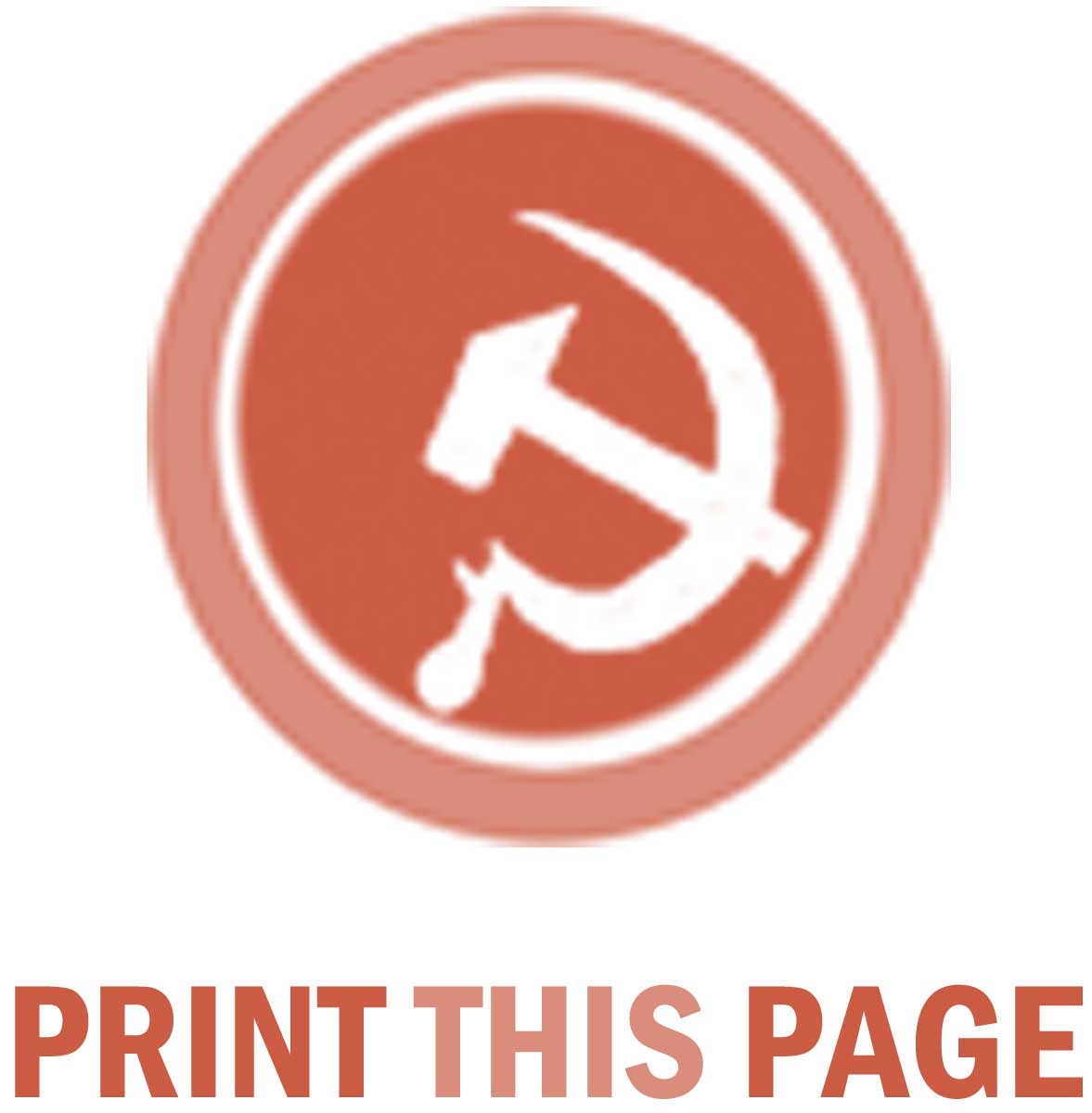
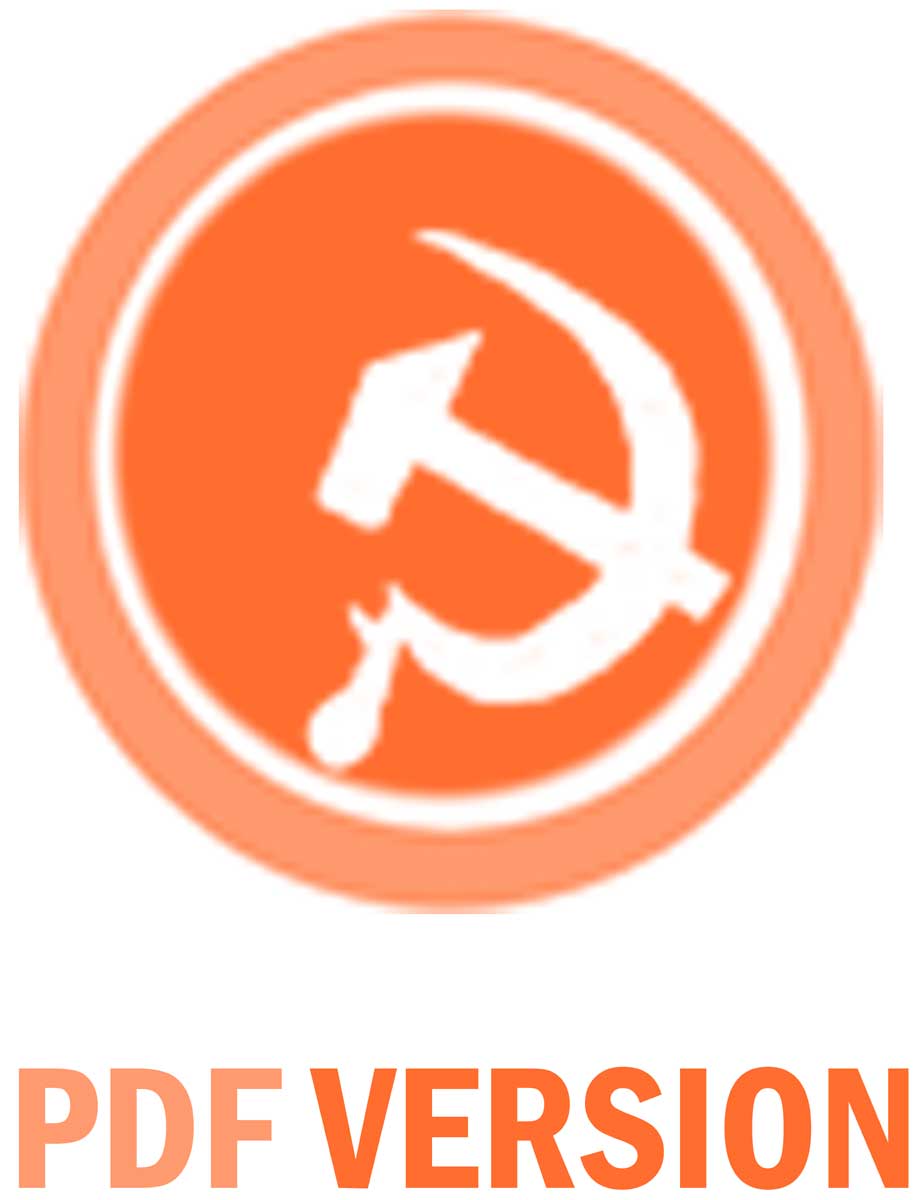
Now, anti-PRC leftists dismiss this state-sponsored union recruitment campaign as simply a case of Beijing trying to head off militancy by corralling workers into the pro-CPC All China Federation of Trade Unions (ACFTU.) They say that the union building campaign, like the Labour Law, is simply another “concession” to workers struggle. There is some truth to this claim. But it is not the whole story. Even if one was to argue that the ACFTU is a completely placid, monolithic, pro-regime beast the assembly of previously unorganised workers into its collective organisations necessarily increases the class pride and solidarity amongst workers. Thus, building up organizations like the ACFTU is not a smart way of dousing the flames of labour demands. If China’s “rulers” were indeed “capitalists” they must really be the most stupid ones around. When real capitalists are forced into concessions they seek to
divide workers by tactically buying off some - they don’t actively try and
unite workers!
The PRC’s union-building campaign has automatically spurred self-activity by workers. Most notably, a grassroots campaign by the ACFTU saw Wal-Mart workers at the Jinjiang Store in Quanzhou City, Fujian province become on 29 July 2006 the first workers in the world to set up a trade union committee at a Walmart store. The U.S. owned Wal-Mart is the largest corporation in the world by revenue and is notorious for its anti-union stance. A report by Australian labour law researcher Chris White (The Chinese Unionise Walmart, 2006) details how the set up of the first Wal-Mart union branch was prepared:
“In front of Wal-Mart exits, [ACFTU] organisers were active handing out flyers and leaflets urging joining. Union pamphlets showed the benefits of joining with special offers for services. Local cadres met workers in restaurants and in their dormitories and homes at night. Reports came in that young women were too scared to join, as management would sack or discriminate against them. Trade union cadres complained to management pointing out the law allowing workers to join. Management said their workers did not want to join. The union locally discussed how to go forward. Wal-Mart’s rude and arrogant attitude was put in the newspapers. Journalists reported the contest, leading to public outcry.”
An important factor in the efforts to build unions and crack down on hardline bosses has been the support of PRC state media. This was the case with Wal-Mart. But other corporate giants like Microsoft, 3M and PwC have also been brought to task by PRC state media for resisting unionisation. As an article in the finance pages of The Australian (11 April 2008) lamented when quoting a Western lawyer who advises capitalist companies in China: “Patti Walsh tells her clients in China that if a union comes knocking, they should accept that they are dealing with the government”! At the recent ACFTU congress, union chairman Wang Zhaoguo, who is also a member of the CPC Politburo, called for “giving more play to the role of the working class as the main force” in society (ACFTU website, 31 October 2008.)
With this message that they are the “main force in society” repeatedly emphasised, it is little surprise that toilers’ social protests in the PRC often quickly head towards a workers “takeover” of whole areas. In China, striking workers often occupy factories, block public highways and take over the streets. A most famous example of such a struggle occurred in Nanchong in Sichuan province in 1997. There the state-run Jianlihua silk factory (as part of rightist reforms that forced many public enterprises to operate more according to market discipline) had laid off employees and cut workers’ pay. Workers were outraged and especially furious at extravagance from the management in these hard times (Living With Reform, Timothy Cheek). So as the general manager prepared for a dubious official ‘inspection tour’ of Thailand with his wife, the workers took him hostage:
“They loaded Huang [the manager] into the back of a flatbed truck and forced him into the painful and demeaning ‘airplane position’ – bent at the waist, arms straight out at the sides. Then they … paraded him though the streets [of Nanchong] just like the Cultural revolution … Workers from other factories joined the spontaneous demonstration … 20,000 people took part.”Living With Reform, Timothy Cheek, 2006
The demonstration ended peacefully after 30 hours with the government ordering that back pay be given to the workers through loans from the state-run bank.
Many Chinese workers understand that for all the problems in the PRC it is still their society and they will ultimately decide things. True, there are major forces, both internal and external within the administration and outside it that are trying to subvert workers’ rule in China. The danger is very, very serious. But the Chinese working class has not had its final say.
People gather at a square under the statue of Mao Zedong at Shaoshan, the hometown of Mao in central China’s Hunan Province on Dec. 26, 2008, to mark the 115th birthday of the former PRC leader.
Strengthen The Workers State!
The issue of whether the PRC is a capitalist state or a workers state is the key question that determines what program socialists in China should struggle for. The understanding that the PRC is a workers state, albeit one with serious deformations, means that pro-working class forces should not seek to undermine the PRC police, army, courts and civic bodies but rather should seek to perfect these organs. The PRC’s state institutions should be seen like a wayward friend – they are in need of serious correction but we still support them. We should help strengthen these bodies by purging them of corruption and privilege and improving them so that they will consistently serve the masses. Russian revolutionary leader, V.I. Lenin explained the point precisely in a 1921 article addressing the role of trade unions in the then young Soviet workers state:
“… it is obvious that under capitalism the ultimate object of the strike struggle is to break up the state machine and to overthrow the given class state power. Under the transitional type of proletarian state, as ours is, however, the ultimate object of every action taken by the working class can be only to fortify the proletarian state and the proletarian class state power by combating the bureaucratic distortions, mistakes and flaws in this state, and by curbing the class appetites of the capitalists who try to evade its control, etc.”
Role and Functions of Trade Unions Under NEP, V.I. Lenin Collected Works
The fact that the PRC remains a workers state also determines the attitude that should be taken to those forces that call for “democracy” in China. In capitalist countries, communists support demands for greater political freedoms as such liberties make it much easier for the masses to organize resistance to the exploiting class. But in a workers state the stance required is more complex. In workers states, Trotskyists call for honest and free discussion among pro-workers state forces because such workers democracy is a key tool for building socialism. However, we do not support giving greater political “rights” to pro-capitalist forces. In a world where most of the biggest powers remain under capitalist rule, “freely” operating pro-capitalist groups in countries like Cuba and China would be able to ride a wave of political and financial resources from overseas backers. Furthermore, if the state institutions in these countries were turned from explicitly pro-communist, pro-working class ones to politically “neutral” institutions, then the “neutral” institutions would soon come under the sway of capitalists and would-be capitalists since it is they who have the greatest wealth and most powerful overseas connections. Understanding all this, Russian, Polish, Czech etc anti-communists and their Western backers made the call for “democracy” (and the associated demand for “separating state institutions” from communist organizations) their main slogan in their 1980s-early 1990s drive to destroy the Soviet and East European workers states. Today, those who push counterrevolution in China sing the same tune.
Recently, the Western media got all excited when Chinese anti-communist academics, lawyers and retired officials signed a “Charter 08,” program for counterrevolution in China. The Charter is modeled on the Charter 77 formed by pro-NATO Czech politician Vaclav Havel, the man who went on to lead the counterrrevolution that destroyed the Czechoslovakian workers state. As is typical, Charter 08 is couched in calls for “democracy” and “human rights.” Democracy has, of course, from its inception in Ancient Athens been contingent on the type of state wherein it is instituted: Athens was controlled by a ruling class of slave-owners and true to form only male, slave-owning landholders were given the right to vote there. Indeed, the end result of the type of “democracy” that is envisaged by the counterrevolutionaries of Charter 08 is given away in a section in the charter titled, “Protection of Private Property.” The section calls for privatizing China’s state-owned industrial and banking enterprises and for privatizing the PRC’s collectively-owned land:
“We should establish and protect the right to private property and promote an economic system of free and fair markets. We should do away with government monopolies in commerce and industry and guarantee the freedom to start new enterprises. We should establish a Committee on State-Owned Property, reporting to the national legislature, that will monitor the transfer of state-owned enterprises to private ownership in a fair, competitive, and orderly manner. We should institute a land reform that promotes private ownership of land, guarantees the right to buy and sell land, and allows the true value of private property to be adequately reflected in the market.”
China’s Charter 08, The New York Review of Books Vol. 56, No. 1
Chinese leftists should organize protest demonstrations outside the offices of prominent Charter 08 signatories. By condemning these open counterrevolutionaries, such mass protests would also push the more mainstream rightists on to the back foot while putting the centrists on notice that their accommodations to the right are not appreciated. Simultaneously, there need to be campaigns to directly curb the political influence of the mainstream right. Capitalist entrepreneurs who are seated in China’s parliaments are getting too cheeky. That is why communists should call for all private bosses – that is, all exploiters of labour – to be banned from seats in the PRC’s national and local parliaments.
To curb capitalist political incursions, the economic power of the capitalists must also be curtailed. No watering down of the pro-worker provisions of the Labour Law should be permitted. Workers and unemployed workers should form action committees to investigate private employers so as to ensure the strict implementation of the Labour Law and to expose any government officials that corruptly collaborate with private bosses. Such workers committees would welcome into their ranks those members of the Chinese police forces, army and labour authorities who want to be involved. To ensure that such grassroots organisations do not get hijacked by counterrevolutionaries seeking to simply disrupt the socialistic order, the committees would make clear from the outset that their goal is to strengthen the workers state.
The way to put more teeth into pro-worker laws is to call for all private bosses that violate the Labour Law to be severely punished by having their enterprises nationalised without compensation. Workers should be organised to occupy the factories of offending enterprises in order to spur on such nationalisations. Nationalisation of parts of the private sector is a key way of ensuring stable employment for workers in this time of uncertainty. PRC state-owned enterprises, unlike private ones, can be more easily controlled to meet social needs like the urgent goal of full employment. Chinese workers should agitate for some of the private firms that close down during the crisis to have their plants taken over by the state, consolidated together and then reopened as state-owned enterprises. Simultaneously, existing state-owned workplaces must take on more staff, including through shortening the workweek of existing employees. All these measures will, of course, require the expenditure of state financial resources. That is why the pressure to make further tax concessions for ailing private firms should be strongly resisted. Instead, taxation of the rich should be increased including through the introduction of a steep capital gains tax on real estate and share market trading.
To mobilize toward all these goals will require a working class with a high degree of class consciousness. The Chinese working class is deeply egalitarian. However, its understanding of the need to organize completely separately from the capitalists has been sapped by decades of the CPC pushing the idea that some “good capitalists” can be allies in the fight for socialism. The way the CPC has posed the issue muddles things up. Exploitation and capitalism are not simply a matter of evil, selfish motives. Rather, they are physical facts based on a structure of production where private individuals own the means of production and make profit from other people: their employees, labour. A private boss may personally be either a nice person or a dirt bag (although the nature of what they to do heavily leans them towards becoming the latter.) Regardless, the private employer’s interest in extracting profit from workers’ labour is counterposed to the interests of the working class which is to retain the fruits of its own work.
In the early years of this century, previous Chinese leader Jiang Zemin formally allowed capitalists to become members of the CPC. This was as part of his theory of the “Three Represents.” Jiang said that some capitalists were also contributing to China’s socialist construction. Now, certainly a workers state may need to use individual capitalists for economic reasons during the period of transition to socialism. But the nature of how capitalists derive their income means that even these capitalists necessarily have an interest in the perpetuation of production for private profit. Thus, regardless of whether we may have to temporarily cooperate with them in economic work, all private bosses cannot but be political opponents in the long-term fight for socialism. They have no place in a party that is meant to politically lead the struggle for socialism.
It is good that even after the emergence of the ”Three Represents” policy, only a tiny minority of the CPC are indeed capitalists. But the embrace of even a small number of capitalists muddies the class struggle consciousness of working class CPC members. After all, the Communist Party is meant to help guide the working class on its long march away from the degradations of capitalism through socialism and ever onwards towards the great goal of a classless, stateless communist society. So how, then, is a working person meant to view the presence of even one capitalist in the echelons of the Party where that capitalist can conspire to stray the people away from this path for the sake of his filthy profits or, even worse, capitalist restoration itself. That is why all private bosses should be removed from membership of the CPC. On the other hand, professionals and the self-employed should continue to be welcomed into the CPC, provided that they decisively junk any ambitions they may have had of becoming future capitalists and on condition that they commit themselves to fighting for a wholly working-class oriented program. The Chinese toilers need a party that is based on the uncompromising class struggle principles and glorious internationalism of the CPC when it was first founded in 1921.

Tibetan villagers dance to celebrate the announcement of the annual Serfs Emancipation Day and little wonder! In the days of the old order under the Dalai Lama, the majority of the rural population were serfs, little better than slaves & without schooling or medical care. In those days, Drepung monastery was one of the world’s biggest landowners with its 185 manors, 25,000 serfs, 300 great pastures & 16,000 herdsmen. The Dalai Lama himself lived richly in his 1000-room, 14-story Potala Palace. Tashì-Tsering, a victim of repeated rape beginning at age nine, reports that it was common for peasant children to be sexually mistreated in the monasteries. (Goldstein, Siebenschuh Tashì-Tsering, The Struggle for Modern Tibet: The Autobiography of Tashì-Tsering, 1997.) In 1959, the year Tibetan serfs were finally liberated, an exhibition was held to demonstrate the torture equipment that had been used by the Tibetan overlords: handcuffs of all sizes including small ones for children, instruments for cutting off noses & ears, gouging out eyes, breaking off hands & hamstringing legs, hot brands, whips & special implements for disemboweling. (A.L. Strong, Tibetan Interviews, 1959.)
The Most Important Political Issue in the World
Of course, it is all well and good for Marxists living in the West to advocate what they think the Chinese masses should do but what really counts is what stance we take with respect to PRC related matters in our own countries. And our stance here actually matters a lot. The main pressure for capitalist counterrevolution that bears upon the PRC comes from the outside. It comes from Western officials demanding that China privatize its key industries, from international anti-communist condemnations about “human rights,” from things like the attempts to sabotage the Beijing Olympic torch relay and from the anti-China military build up of the U.S and her allies. It is the duty of socialists in the West to relieve this counterrevolutionary pressure.
Unfortunately, at the moment, most Western far-left groups are actually adding their weight behind the anti-PRC forces. Last April, the DSP actively mobilised for the anti-PRC so-called “Free Tibet” protests that accompanied the Beijing Olympics torch relay in Canberra. In doing so, they were indistinguishable from anti-communist liberals that naively want to bestow upon the Tibetan people the overthrown Dalai Lama-led slave/serf owning nobility. Worse still, the DSP ended up standing in the anti-PRC rallies on the same side as large numbers of die-hard Vietnamese anti-communists. The latter were bearing flags of the defeated U.S.-puppet regime in South Vietnam as a symbol of their hatred for pro-communist rule in both China and Vietnam. Also there as part of the anti-PRC bloc was the right-wing Falun Gong group who made a point of burning the communist hammer and sickle red flag.
The RSP which for completely different reasons split from the DSP soon after the torch relay has not, in any of the voluminous documents arising from the split, distanced itself in the slightest from the DSP’s prominent anti-PRC stance. Through this silence the RSP has essentially consented to the anti-communist campaign that their former group was part of. RSP and DSP members ought to consider the incisive comments on the question of the anti-PRC torch relay protests that were made by their mutual idol, Cuban Revolution leader Fidel Castro. In a 31 March 2008 statement titled “The Chinese Victory,” Castro wrote:
“Until the Second World War, the United States considered it [Tibet] a part of China and even brought pressures to bear on England in this connection. Following the war, however, they saw it as a religious stronghold that could be used against communism.
”When the People’s Republic of China implemented the agrarian reform on Tibetan soil, the elite saw its properties and interests undermined and opposed the measures. This led to an armed uprising in 1959. Tibet’s armed rebellion —as opposed to those in Guatemala, Cuba and other nations, where fighting took place under truly harsh conditions— was prepared for years by US secret services….
” The Dalai Lama, bestowed with the US Congress’ Gold Medal, praised George W. Bush for his efforts in defense of freedom, democracy and human rights....
“Why is imperialism so intent on forcing China, directly or indirectly, to lose its international significance?…
“The campaign orchestrated against China is like a bugle call aimed at unleashing an attack on the country’s well-earned success and against its people, who will host the next Olympic Games.
“The Cuban government issued a declaration categorically expressing its support of China in connection with the campaign undertaken against it on the issue of Tibet. This was the right stance to assume.”
“I respect the Dalai Lama’s right to believe, but I am not obliged to believe in the Dalai Lama.
“I do have many reasons to believe in China’s victory.”
Leftists in the West need to go through a painful reorientation of their stance on the PRC. Trotskyist Platform (TP) is willing and ready to be a part of this clarification process. In late 2006 we organized a demonstration outside the Sydney headquarters of the Carlyle Group in solidarity with the (ultimately successful) campaign by Chinese leftists to stop the Carlyle-led privatisation of state-owned Xugong Construction Machinery. Then last year, TP actively stood against the anti-PRC mobilizations that preceded the Beijing Olympics. Today, TP calls for the building of united front campaigns to oppose Western demands for China to liberalise its economy, to expose anti-communist, anti-PRC propaganda and to support particular pro-working class measures taken by the PRC like its new Labour Law. Such a united-front, pro-Red China movement should seek to include the CPA, Trotskyist Platform and pro-communist immigrant groups but must then actively broaden out to win a section of the Cuba solidarity movement as well as Marxist activists within the union movement.
The question of the PRC is the globe’s biggest political issue. In part this is because China has 20% of the planet’s people as well as the world’s fastest growing economy. But most importantly, no matter how skewed and uncertain its construction of socialism, the development of the pro-communist PRC brings to the fore the issue of communism versus capitalism. Those in the West that call themselves communist must take the communist side on the question of the PRC. The outcome of events in the PRC will heavily weigh, on one side or another, the balance of forces between exploiters and exploited in every country. Here, it will shape the struggle for workers rights, the fight to oppose Western imperialism in the Middle East and the struggle for Aboriginal rights. That is part of the reason why it is so urgent that Marxists here in Australia stand for the defence of the PRC against capitalist counterrevolutionary forces and imperialist military pressure. •








